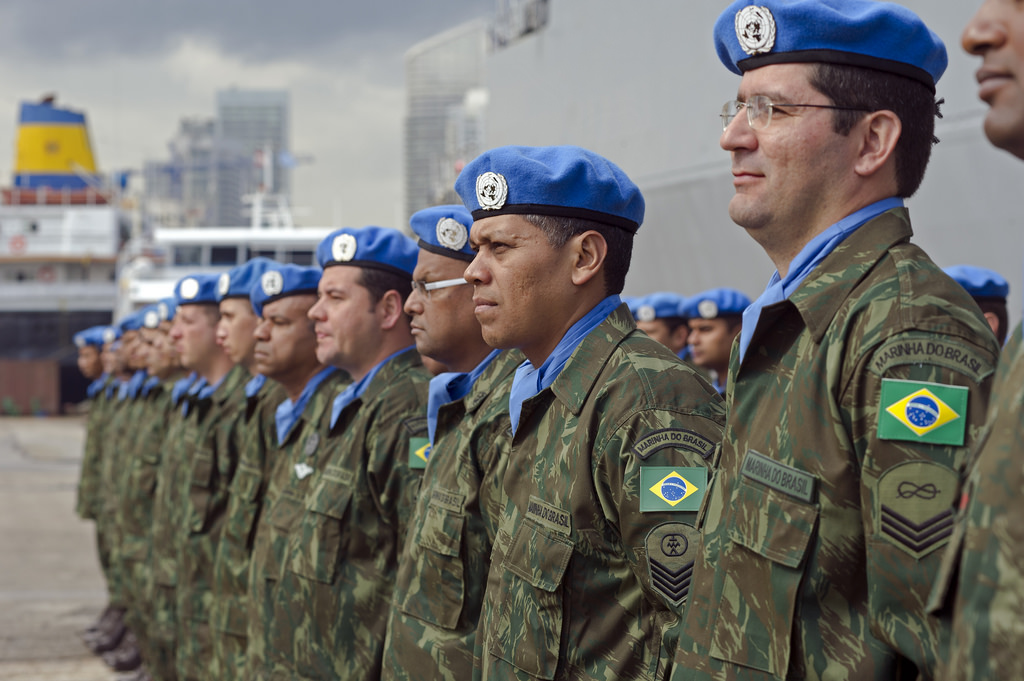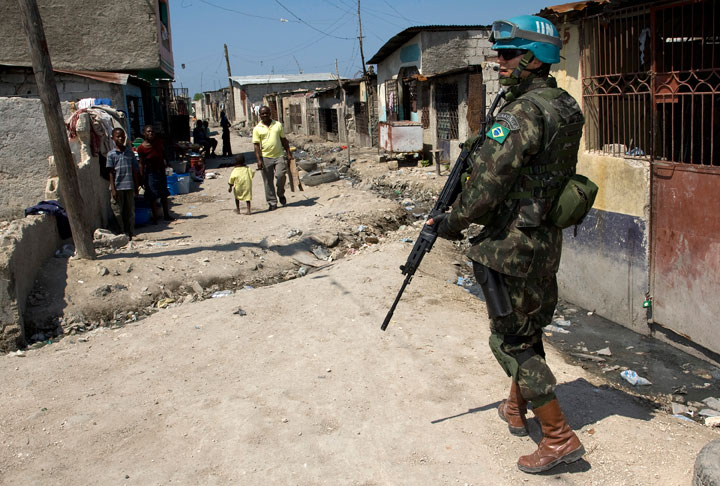What’s Next for Brazilian Peacekeeping?
With the drawdown of the UN Stabilisation Mission in Haiti (MINUSTAH), the most significant contribution to UN Peacekeeping in Brazil’s history will soon be coming to an end. Since 2004, the country has constantly provided military force commanders and the largest troop contingent to MINUSTAH. This engagement was part of Brazil’s activist foreign policy under President Lula da Silva (Worker’s Party, in office 2003 – 2011). The aim of showing regional leadership as an emerging power was backed by a significant financial investment: contrary to many other troop contributing countries from the Global South, Brazil’s expenses on peacekeeping far outstrip reimbursements by the UN. Subsequent governments of Dilma Rousseff (Worker’s Party, in office 2011-2016) and Michel Temer (PMDB, in office since 2016) have not pursued similarly ambitious foreign policies while dealing with an ongoing political and economic crisis. As a consequence, Brazil’s rise on the global stage has stalled. The withdrawal of troops from Haiti thus raises the question: what’s next for Brazilian peacekeeping?
An answer to this question could give insights into the possible future direction of Brazil’s foreign policy. After the controversial impeachment of President Dilma Rousseff, the government led by her former Vice-President Michel Temer quickly turned to accusing the Worker’s Party governments of having pursued an “ideological” foreign policy that didn’t serve the country’s interests. Contrary to these accusations, Brazil’s foreign policy has in fact been remarkably pragmatic throughout the Worker’s Party rule. Despite openly declaring its ambition of shaping a multilateral world order as leading nation of the Global South, the country has also constantly tried to maximise its influence within the established parameters of international politics.
This calls for a nuanced perspective on Brazil’s rise on the global stage in general—and for the purpose of this op-ed, UN Peacekeeping in particular. As Kai-Michael Kenkel and I have argued in a recent article in International Affairs, the country has sent mixed signals with regards to humanitarian intervention and UN Peacekeeping. On the one hand, Brazilian diplomats have tried to uphold traditional foreign policy principles of the developing world—such as non-intervention in sovereign states—while propagating own norms for the protection of civilians in conflicts with the ultimately failed “Responsibility while Protecting” initiative. On the other hand, the military’s actions in Haiti contradicted Brazil’s usual focus on non-violent conflict resolution: some generals even became leading actors in the growing coerciveness of UN Peacekeeping. Their interpretation of the robust mandate pleased greater powers and the UN Department for Peacekeeping Operations, who were interested in a more effective protection of civilians.
After the failure of UN missions to prevent atrocities in Rwanda and Srebrenica, the majority of peacekeeping mandates since the beginning of the 21st century were partially or entirely based on Chapter VII of the UN Charter—rather than monitoring peace agreements, blue helmets were thus allowed to use force in order to defend civilians. The mission in Haiti then was a trailblazer for the increase in stabilisation operations, in which the UN often is virtually “at war” against armed groups. At the beginning of MINUSTAH, Brazilian troops and force commanders were facing significant pressure by the UN and greater powers such as the United States and France who requested a more coercive approach against gangs in Haiti’s capital Port-au-Prince. Despite initially declaring their discomfort, Brazilian force commanders soon embraced permissive rules of engagement; numerous civilians died in raids against gangs in densely populated neighbourhoods. Yet the Brazilian contingent’s approach ended armed groups’ control of parts of Port-au-Prince areas, which led to praise by UN officials. The military ultimately had a more palpable influence on the development of multilateral military interventions than diplomats with their efforts in shaping norms: former force commander General Floriano Peixoto has been part of the High-Level Independent Panel on Peace Operations; force commander General Santos Cruz—in recognition of his role in fighting gangs in Port-au-Prince—has later been invited to lead the military component of the stabilisation mission in DR Congo (MONUSCO), the operation that epitomises the UN’s turn towards peace-enforcement like no other. Its Force Intervention Brigade used artillery and attack helicopters in order to “neutralize” armed groups.

Maritime Task Force peacekeepers during the ceremony of transfer of authority at Beirut port, February 19th 2013
Despite the current Brazilian government’s proclaimed approach of changing the Worker’s Party foreign policy paradigms, there are signs of continuity with regard to peacekeeping. Defence minister Jungmann has recently assured the country’s ongoing commitment. His declaration that significant further troop contributions would serve as means of projecting power abroad hardly differ from the Lula government’s reasons for taking part in MINUSTAH. Yet government and armed forces have not decided where to redirect Brazil’s peacekeeping focus. UNIFIL in Lebanon, where Brazil’s navy already leads the Maritime Task Force, appears to be the most likely future destination. Given UNIFIL’s profile as traditional observer and monitoring mission, it would be easier for Brazilian diplomats to emphasise the continuity of Brazil’s peacekeeping approach. Even though the mission’s mandate is meanwhile based under Chapter VII of UN Charter, the risk of becoming embroiled in hostilities is much lower than in current UN stabilisation missions. A deployment in Lebanon would also allow the country to maintain its policy of focusing on missions in countries with which it shares certain cultural and/or linguistic proximity (Brazil is host to a large Lebanese diaspora). After all, the country has tried to promote a supposed “Brazilian way of peacekeeping”—often somewhat dubiously based on national identity, the awareness of problems in poor countries and close interactions with the local population—as a promising innovation by a troop contributor from the Global South. The language barrier has already complicated the implementation of this model in Haiti and would certainly affect ground troops in Lebanon as well.
It is less likely (but nonetheless possible) that Brazil participates in a stabilisation mission in Africa. Decision-makers in government and armed forces are currently weighing up the pros and cons of sending troops to Mali (MINUSMA) or the Central African Republic (MINUSCA). Both missions are prime examples of the UN peacekeeping’s turn towards stabilisation, perhaps even more so than MINUSTAH. Blue helmets have suffered fatalities in regular fights against extremist groups and rebels For Brazil, which has not lost a single soldier in combat in Haiti, an engagement in such an environment would therefore constitute a significant challenge. First of all, diplomats and politicians would have to stop pretending that Brazil would not take part in Chapter VII missions. Yet if even highly popular president Lula shied away from publicly declaring that the country was playing a central role in peace-enforcement, how would a weak and embattled government sell this engagement and the risk of losing soldiers to the Brazilian population? It is moreover unclear how much of the supposed “Brazilian way” of peacekeeping could be transferred to a context of religious extremism. Apart from these undeniable risks, participating in MINUSMA or MINUSCA would also present some opportunities for Brazil’s diplomacy. Finally accepting the UN’s repeated request for sending troops to one of the critical missions in Africa would help Brazil maintain the status it has gained with its leading role in MINUSTAH. Peacekeeping might thus be one of the few policy areas in which Brazil would continue to be able to punch above its current global weight.

This article is published under a Creative Commons Attribution-NonCommercial 4.0 International licence.


Excellent article, deeply connected to the Brazilian military and diplomatic perspective.